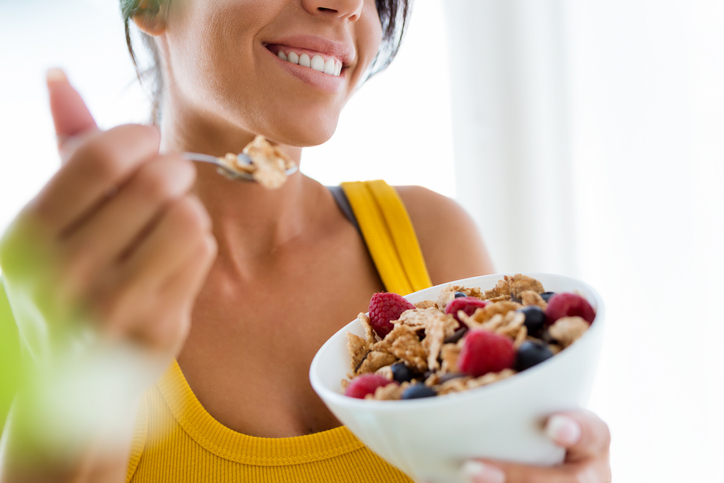
As an aspiring nutrition professional, you may notice that guidelines for athletes have changed over the years as new scientific discoveries are made in the sports nutrition field. It is important for everyone in the nutrition industry to stay up to date with the latest research to relay this information to their clients, athletes or not.
With the Integrative Nutrition program at Rhodes Wellness College, you will have the advantage to start careers in two sectors – both the front lines of mental health, emotional health, and addiction recovery as well as the front lines of nutritional wellness. Protecting the mental health of athletes as you provide them with the nutrition-related tools they need to perform optimally will make you a unique asset to the industry, and highly sought-after. Take a look at the different needs of athletes and how you will integrate your skills to best serve them.
Athlete Protein Requirements and Differentials
A reference widely accepted by those living in North America that you may be familiar with while in nutritionist school is the Dietary Guidelines for Americans, 2020-2025. This generic outline recommends the average person make up between 10% and 30% of their total calories in a day from protein sources. If you’re pursuing this career path, then you are motivated to help your future clients as best as you can, which means diving a little deeper for these athletes.
Protein plays an essential role in sports nutrition, providing the body with the necessary amino acids needed to help muscles repair and recover from activity (Ivy, 1991). According to the dietary reference intake for adults, females should aim to consume 46g of protein daily, and males 56g (Ross et al., 2011).
For athletes, this recommendation differs. According to ISSN, athletes should consume between 1.2-2.0 grams of protein per kilogram of body weight (Kerksick et al., 2018). This can help athletes avoid injury and prevent muscle wasting over time.

Athlete Carbohydrate Intake Recommendations Based on Training Volume
Carbohydrate recommendations for athletes are also different from the general population recommendations. Carbohydrates serve as an important energy source for activity, so athletes that spend multiple hours a day exercising need to consume enough carbs to foster optimal performance and recovery.
Carbohydrate recommendations for athletes differ depending on the intensity of their exercise sessions and how often they occur. For athletes participating in intense exercise for 2-3 hours per day, 5-6 days per week, carbohydrate intake should be 5-8g/kg of body weight. For athletes participating in 3-6 hours of intense exercise, 1-2 times per day, 5-6 days per week, carbohydrate intake should be higher at 8-10g/kg of body weight (Kerksick et al., 2018).
As a future graduate of the Professional Integrative Nutrition Diploma program, you may find yourself working in a variety of placements as you navigate this new career. Some common options include working as Nutrition Educators, Nutrition Consultants, Wellness Managers, Wellness Counsellors, and Life Coaches. A deep understanding of the changing nutritional needs of each individual that you study in this program will allow you to quickly grow your confidence in this exciting new field.

Recommended Athlete Fat Consumption for Those in Nutritionist School
Healthy fat sources in the diet help to maintain bodily processes such as hormone metabolism and neurotransmitter function. Healthy fats also help with increased levels of satiety and can even serve as a concentrated fuel source for athletes when their energy demands are high (Kerksick et al., 2018)
The ISSN recommendation for fat intake for athletes is around 30% of their daily calories. They also state that athletes can safely consume up to 50% of their daily calories as fat sources, while athletes needing to decrease their body fat can consume around 20% of their daily calories as fat sources (Kerksick et al., 2018).
With the integrative program at Rhodes Wellness College, you will gain valuable skills that qualify you to integrate nutrition guidance for specialized populations, as well as professional counseling. This will not only help your future clients reach their physical health goals easier, but also help them overcome issues that branch into non-nutrition areas.
Are you interested in taking the Professional Integrative Nutrition program?
Contact Rhodes Wellness College for more information!
Works Cited:
Kerksick et al. Journal of the International Society of Sports Nutrition (2018). ISSN exercise & sports nutrition review update: research & recommendations. Retrieved from https://jissn.biomedcentral.com/articles/10.1186/s12970-018-0242-y#Sec56
Ivy et al. Sports Medicine (1991). Muscle glycogen synthesis before and after exercise. Retrieved from https://pubmed.ncbi.nlm.nih.gov/2011684/
Ross et al. Food and Nutrition Board, Institute of Medicine, National Academies (2011). Dietary Reference Intakes (DRIs): Recommended Dietary Allowances and Adequate Intakes, Total Water and Macronutrients. Retrieved from https://www.ncbi.nlm.nih.gov/books/NBK56068/table/summarytables.t4/?report=objectonly









